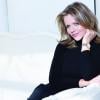
Shadows of a dark outside world fell across Renée Fleming’s Cal Performances recital at Zellerbach Hall on Friday evening, dimming some of the esteemed soprano’s wonted luster.
The program, entitled “Voice of Nature: The Anthropocene” and expanding on Fleming’s 2021 album of the same name, addressed the somber topic of climate change. (“Anthropocene” — from the Greek anthropos, human — is a term used to designate the current era of geological time, with nature dominated by human influences.)
If the crisis of climate change was not dark enough, the outside world intervened even more directly during the recital’s first half, as a shooting incident occurred at UC Berkeley’s Lower Sproul Plaza, just outside the concert hall. Police reports as of this writing indicate that no one was injured. The Cal Performances audience was told to shelter in place — even to the point of not going into the lobby, where nothing but glass separates one from the outside. Executive and Artistic Director Jeremy Geffen kept the audience informed and calm.
Fleming performed songs to celebrate the beauty of the natural world, such as Handel’s serenely glowing aria “Care selve” (Beloved forests) and a bluesy number by Hazel Dickens (“Pretty Bird”). But these tended to be overshadowed by longer and thornier contemporary selections with explicitly ominous texts, like “Endless Space” by Nico Muhly and “Evening” by Kevin Puts (the latter featuring these lines by poet Dorianne Laux: “We know we are doomed, / done for, damned”).
The ecological message was clear and admirable: The dangers the world faces need to be strongly felt in many different ways. And yet, this presentation was not, in the end, fully successful.
Fleming’s recital was strikingly eclectic in style, including a number of songs outside the usual art-song repertory — from Björk’s “All Is Full of Love” to Burt Bacharach’s “What the World Needs Now.” One song was even in Elvish — “Twilight and Shadow” from Howard Shore’s soundtrack to The Lord of the Rings. These were a welcome counterpart to the pessimism of the climate-change songs.
Projected behind the performers throughout the first half was a collage film about the beauty of the natural world and its struggle to adapt to climate change, made especially for this project by the National Geographic Society. The clips brought little that we have not seen many times in nature shows, though the images were, as expected, beautifully photographed.
The program’s eclecticism, combined with the admonitory agenda and the overdone film, made it hard to focus on the music and the performance. I imagine that most listeners coming to the recital would have expected Fleming to delve deeper and longer into a style or mood of art song.
For me, the most memorable piece from the first half was Fleming’s confident and passionate rendition of one of her classics, “Baïlèro” from Joseph Canteloube’s Songs of the Auvergne. It’s a beautiful song, and she knows it intimately. In this and all the other songs, Fleming was accompanied with style by the excellent collaborative pianist Howard Watkins.
Throughout the evening, the soprano’s rich lower register was in good evidence, but her higher notes were less than golden, with pitch issues and a slight sense of strain.
The concert’s second half was a more traditional recital set, with four lovely late-Romantic art songs (two by Gabriel Fauré and two by Edvard Grieg) followed by an operatic chestnut: Giacomo Puccini’s “O mio babbino caro” — the kind of song with which Fleming always enchants an audience. The recital ended on a cute note with Andrew Lippa’s snarkily self-referential put-down of celebrity sopranos, appropriately titled “The Diva.” And appropriately, Fleming sang in a sparkling golden gown for the second half.
For her encore, the soprano invited the audience to sing along to Leonard Cohen’s “Hallelujah” — like much of the program, this familiar music seemed full of shadows. Here and through the whole recital, Fleming demonstrated her usual gracious rapport with the audience, in comments and in song.
It was heartening to see student-age attendees in the hall: Geffen asked for a show of hands and explained that Cal Performances has instituted a program supporting a limited number of $10 tickets for Cal students. Hopefully, that program can be expanded to bring in even more young people.




